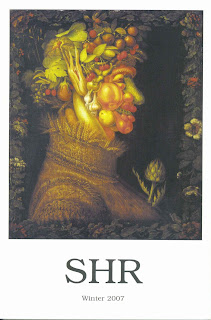
I’ve been on a kick of reading short stories. Partially because I have discovered I can read them while exercising on a treadmill or elliptical machine, usually finishing an entire story in about 30 minutes. It certainly beats the heck out of watching a.m. television! Over the next few days, perhaps weeks, I hope to offer a few notes on some of the most exciting stories I’ve read recently:
The Museum of Wooden Architecture by J.D. Chapman, Southern Humanities Review Winter 2007
This is the story of Travis Gruoch who wants to grow up to be astronaut, until the Challenger explosion. As an alternate focus for his Cold War fascination, Travis signs up to study Russian in high school and eventually follows his passion to participate in a Russian-American exchange program. The bulk of the story covers Travis’ outrageously funny stay in Russia.
J.D. Chapman offers up some wonderful character descriptions and details throughout this joyride of a story:
Mr. Metz [the Earth Science teacher] had learned to play the bagpipes in the Air Force, and was good at that; during assemblies and pep rallies he put on his blue kilt, his legs naked and incongruous beneath, like an Airedale’s, and he paraded around the basketball court with the thing under his arm like a speared goose.
She [Ms. Kromer, U.S. History teacher] had long legs and hair the color of V-8 . . .
No one encouraged Travis to take Russian, or even pointed out that it was available; it sat there on the mock schedule after French and before Spanish like an auk among pigeons.
The dialogue as Travis interacts with his Russian host family is particularly funny as well:
He [Travis] remembered the word for tasty, and he said it many times though he didn’t find it so. “Big thanks,” he said. “Very, very tasty. Very good.”
After dinner, Vladim put on a bluegrass record. He asked Travis, “Do you know it?” in Russian, and then pronounced, “Bloo-Grras!” in English. He snapped his fingers.
Travis said, “Of course. Yes. Music of Virginia, of my homeland,” and he snapped along with it though it was some kind of phony studio crossover shit with an electric bass and drums, and harmonies all wrong, not high lonesome at all but corny and sweet as a Disney kids’ record, and anyway Travis like John Cougar Mellencamp. He said, “My favorite!”
Vladim opened up a cabinet and took out a bottle of vodka. Tanya said, “No!” and looked embarrassed, but Vladim waved her off and said, “My son! My big, American son!” He poured the vodka into tall glasses, then spooned in sugar and bilberries. It burned, but it was very good. Travis had never been drunk before. His face was warm, and he said, “I love y’all,” and he tried to teach Tanya the buck-and wing.
As with all the best short story humorists (Twain, Tobias Wolff, Bobbie Ann Mason, to name a few), J.D. Chapman artfully shifts tone by the end of the story to make you feel deeply with the main character. The final paragraphs of the story hearken back to the opening images, but whereas the opening was light-hearted, the last scene is melancholy. There is the shock of mature insight. Through Travis’ eyes we get a strong sense of the impact of Cold War repression and the ongoing poverty of the Russian culture. This is absolutely one of the best short stories I’ve ever read.
No comments:
Post a Comment